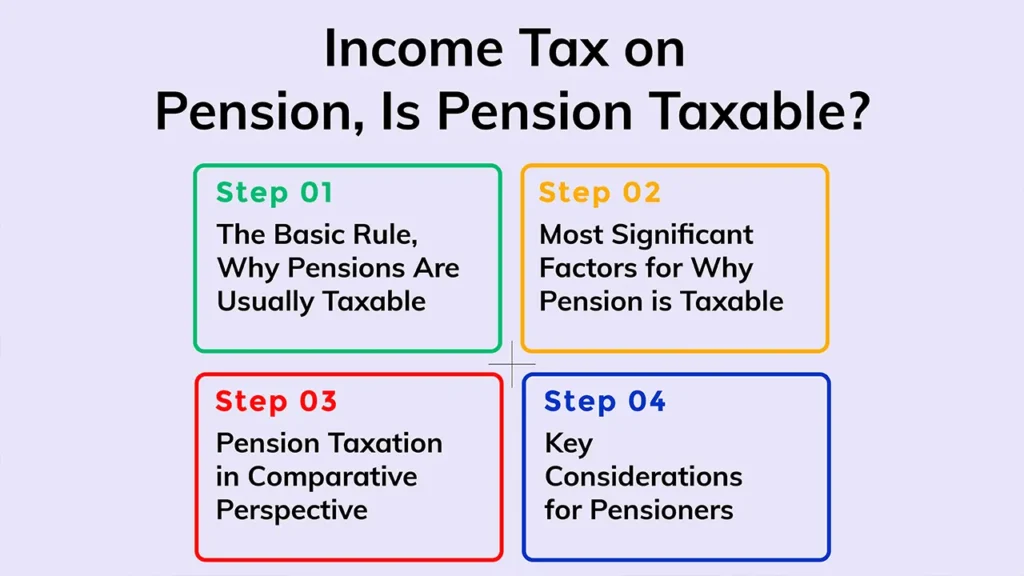When you retire, is Income Tax on Pension: Is Pension Taxable? The answer is not, in large part because so much depends on where you live and the nature of the pension you receive.
In this article, we will approach the taxation of pension income in a broader sense and cover how different countries normally treat pension income for tax, so you have a knowledge of the general principles involved and what the typical triggers are.

Section 1: The Basic Rule, Income Tax on Pension: Is Pension Taxable?
Pensions as Taxable Income: The Basic Rule
For the most part, countries regard pension payments as income, much like wages. That’s because they are generally going to be taxable income.
Governments charge taxes on income to finance public services, and retirement income, including pensions, is a major part of the income sources in this. Broadly accepted nomenclatures of pension income in tax laws are “Salary Income” or “Income from other sources”.
Section 2: Most Significant Factors for Why Pension is Taxable
Where Will the Pension Go? (Source of Income)
- State Pensions: Such as, but not restricted to, Social Security in the US, the UK State Pension, Canada Pension Plan/Old Age Security in Canada, and the Age Pension in Australia. They are often fully or partially taxable, sometimes with a threshold or offset.
- Private/Occupational Pensions: There are 2 main types, occupational pensions, which are workplace pensions, and personal pensions, generally subject to income tax and subject to different rules on contributions and withdrawals.
Pensions “Commuted” vs “Uncommuted” (Lump Sum vs. Periodic Payments)
- Lump Sum Commuted Pension: This is a lump of payment. Tax treatment is very uneven; some countries, often out of a desire to protect certain conditions (such as age), grant partial or total exemptions of ETP.
- Uncommuted Pension (Regular Payments): These are regular (e.g., monthly) payments and are nearly always taxed as regular income.
Your Tax Residency Status
- Resident vs. Non-Resident: Your residence (the country in which you reside and are considered a resident) generally determines where and how your pension is taxed.
- Double Taxation Agreements: There are agreements between countries that aim at ensuring people do not pay tax twice on the same income and often lay down which country has the main right to tax your pension. For more on Double Taxation Avoidance Agreements (DTAA) and how they apply to NRIs in India, refer to ClearTax’s DTAA benefits guide.
Payments to the Retirement Association
- Pre-Tax Contributions: If you contributed with pre-tax dollars (meaning you got a tax break on the contributions), withdrawal of the pension income is generally fully taxable.
- After-Tax Contributions: If you contributed, or you believe part of your contributions included after-tax money, a portion of your pension payments may be a return of your own money and thus tax-free. That is typically described as your “cost basis” or “Investment and Wealth Growth in the contract.”
Your Age and Allowances/Exemptions
Most countries provide personal allowances or tax-free thresholds, which can allow tax-free receipt of a certain amount of pension income.
There could be some countries that have well-defined exemptions or tax advantages for retired individuals above a certain age.
Section 3: Pension Taxation in Comparative Perspective (Treatments in Various Countries)
Federal and State Considerations in the United States
- Federal Tax: Federal income tax generally is not withheld from pension, annuity, profit-sharing, or other deferred compensation payments. What is really at issue here is “taxable part” vs “return of basis”.
- State Tax: State income tax on pensions varies; some states offer exemptions.
- Social Security Benefits: May be deemed partly taxable based on total income.
UK: Tax-Free Lump Sum and Taxable Income For Pensioners
- 25% Tax-Free Cash Lump Sum: One popular rule enables a segment of the pension pot to be withdrawn without tax.
- What Remains as Taxable Income: The remainder is generally taxed as income at your marginal rate.
- Emergency Tax: Details of when emergency tax can be used at the outset to be recorded.
Canada: Federal and Provincial Taxation
- CPP/QPP and OAS: These government pensions are typically taxable.
- Private Pensions: Usually taxable, too.
- Non-Resident Tax: Non-resident tax applies to recipients of Canadian pensions who are non-residents of Canada, including treaty variations.
Australia: Exceptions based on age
- Over 60 and Superannuation Pensions: Superannuation pension payments are usually tax-free when you’re aged over 60.
- Under 60: Payments are generally taxable.
- Conditions of use Age Pension: Government Age Pension is generally assessable income; however, several offsets may reduce the amount of tax payable.
Section 4: Key Considerations for Pensioners
The Role of Tax Withholding
Pension payments are frequently subject to the direct deduction of tax. It’s also helpful to adjust your withholding (eg, with W-4P in the US) to avoid over- or underpayment.
Avoiding Common Mistakes
- Not understanding your specific country’s rules.
- Failing to account for income from all sources (e.g., government pension, private pension, investments).
- Not seeking professional advice for complex situations or cross-border pensions.
Seeking Professional Guidance
The question of when to see a tax adviser is critical, particularly for people with pensions from more than one country or with substantial assets. This is a market in which international tax professionals can offer some valuable expertise.
Conclusion: Pension Tax Breaks for a Comfortable Retirement
In Conclusion, pension is taxed, but it largely depends on several factors. It is important to know the tax effects on your pension for proper retirement planning. Look up tax laws in your own country of residence as well as the countries where your pensions are based, and take professional advice if necessary.
FAQs
Is pension taxed in every country of the world?
Not all countries are the same when it comes to pensions. Although the majority of tax pension income, the rates and exceptions vary widely.
What is the distinction between commuted and uncommuted pensions?
A commuted pension is a single payment; an uncommuted pension is a monthly payment. But they can be treated differently for tax purposes.
How does my residency status affect my pension tax?
The location where your pension is taxed is based on your residency status. Non-residents may be subject to other tax rules, and double taxation may be avoidable.
Are there any tax breaks for pensioners?
Most countries have a personal allowance or tax-free threshold for pensioners , which generally reduces the amount of tax payable on income, though some countries limit the allowance for higher earners.
Do I need to see a tax adviser about my pension?
Yes, particularly if you have pensions from different countries or a complicated financial situation. A tax planner can help you traverse the murky waters of pension tax.

Leave a Reply